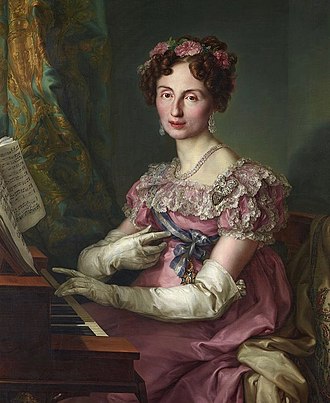Princess Amalie of Saxony
(10 August 1794 – 18 September 1870),
Princess of Saxony, full name Maria Amalia Friederike Augusta Karolina Ludovica Josepha Aloysia Anna Nepomucena Philippina Vincentia Franziska de Paula Franziska de Chantal, was a German composer writing under the pen name A. Serena, and a dramatist under the name Amalie Heiter.
La casa disabitata (1835)
comic opera in one act, first performance 17 September 1835, Pillnitz Castle, Dresden.
[영문 해설자료 -La casa disabitata (1835)]
Life
Princess Amalie lived her entire life in Pillnitz Castle near Dresden, Germany. She was a well-educated and intellectually curious woman who composed chamber music, opera, and sacred music, sang, wrote comedies, and played the harpsichord.[2]
Amalie was a young girl during the time of the Napoleonic wars and had to flee from her castle several times. She and her family were forced to sleep on straw wherever they could find shelter. She met Napoleon several times and held a negative opinion of him. When Napoleon observed that she was angry with him because he warred against her family, but that she should and would accustom herself to the situation, she firmly replied that there were some things that can't be accustomed to.[3]
Career
Music
Amalie studied music with Joseph Schuster, Vincenzo Rastrelli, Johann Miksch, Franz Anton Schubert and Carl Maria von Weber. She began writing music in 1811 and composed numerous operas, popular among the Dresden elite. She published her musical works under the pseudonym A. Serena. Her most popular compositions were her comedic operas. She portrayed her characters with innovation and color.[4] Weber found her "highly talented."[5]
Dramatics
In 1829/30, she published two dramas under the name of Amalie Heiter. Among her subsequent dramatic works, which were noted for a love of humanity and virtue, her comedies Der onkel (“The Uncle”) and Die Fürstenbraut (“The Prince's bride”) became very popular. The latter was performed in Paris under the title Une femme charmante (“A charming woman,” 1840). Others of her plays were also adapted to the French stage. A complete edition of her dramatic works was published in Dresden, for the benefit of the women's association, under the title of Originalbeiträge zur deutschen Schaubühne (“Original contributions to the German stage,” 6 vols., 1837–42). A 3rd edition of the 1st volume appeared in 1858, and a French version of it (Comédies) at Paris in 1841. Six of her dramas were translated into English by Jameson (London, 1846), and six others were translated anonymously (1848).[6]
'♣ 음악 감상실 ♣ > [광시,변주,서곡]' 카테고리의 다른 글
| Guillaume Lekeu - Overture after Victor Hugo's Les Burgraves (1890) (0) | 2016.08.17 |
|---|---|
| Carlo Soliva - Giulia e Sesto Pompeo - Ouverture (0) | 2016.08.10 |
| Antonio Salieri - Ouvertures (0) | 2016.06.16 |
| Franz von Suppé - Overtures (0) | 2015.10.17 |
| 오페라 6선 (0) | 2015.09.24 |

